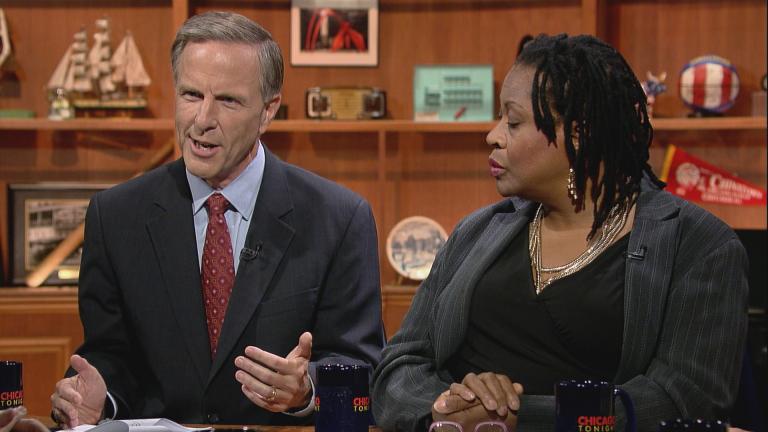Watch the video: A panel discussion on motorist's rights – and the right way to act – when stopped by police.
The family of Illinois motorist Sandra Bland filed a lawsuit Tuesday against law enforcement officials in Texas, including the state trooper who puller her over for a lane change violation.
Here to discuss motorists' rights–as well as the right way to behave when getting stopped by the police–are Steve Stelter, chief of police of west suburban Brookfield and a past president of the West Suburban Chiefs of Police; Joe Miller, chief of police of south suburban Palos Park; and Khadine Bennett, a legislative counsel for the American Civil Liberties Union of Illinois.
Below, highlights from Phil Ponce's discussion with Stelter, Miller and Bennet. Please note that questions and answers have been condensed. Watch the video for the complete discussion.
Phil Ponce: Your thoughts on the Sandra Bland encounter, now that the video has been seen?
Steve Stelter: It’s a shame, it’s a travesty that this poor young lady lost her life. Nobody in law enforcement is happy when dealing with subjects and dealing with people, as we do; taking them into custody, holding them in our facility and being responsible for those people. And then we have a tragic death like this young lady. It’s terrible.
Joe Miller: I think we can learn from it. It’s a terrible tragedy. We need to take what we saw and learn from it – how can we de-escalate a situation, not escalate it.
PP: How common is it to pull someone over for a lane change? Is that the right thing to do?
SS: Absolutely, it’s a violation of the law, and traffic stops like that are considered minor violations, but they do occur and it is against the law and the officer has every right to make that traffic stop
JM: We’ve pulled over a little over 1,000 motorists this year to date, only one of those resulted in a violation for failure to signal, but that’s also tied to DUI and so forth.
PP: Should the officer have done more to de-escalate the situation with the initial traffic encounter?
SS: Up until the point where she refused to put the cigarette out, the officer was very polite. He was very kind, he told her he was going to write her a warning ticket, his demeanor was professional, and at that point in time, when he asked her politely to put the cigarette out and she didn’t, something went on there. I don’t know what was going on inside the car, I don’t know what it was he was feeling, maybe a little threatened, I don’t know.
PP: How about that specific request on the officer’s part for Ms. Bland to put her cigarette out, was that a reasonable request or a legal request?
Khadine Bennett: I think that smoking a cigarette in your car is a legal thing to do, so I think she was well within her rights to do that. She wasn’t flailing the cigarette, she wasn’t jabbing it toward the officer, his life was not in jeopardy from looking at the video. So, I think she was reasonable in not putting it out. I think the officer could have done numerous things to de-escalate the situation, but he decided to escalate that situation.
PP: What advice to give to people in terms of here’s what you have to do?
KB: We tell them that if an officer asks you to leave the vehicle, you have to comply. If they ask the passenger to leave the vehicle, you have to comply. But one of the things that we really stress is that we believe that all individuals should be treated with respect, no matter your age, your race, your sexual orientation, your gender. But, even if you do everything right the way that we tell you to do, there’s still going to be situations
PP: What advice do you have in those situations, when the encounter is not great?
KB: So in the situation of a search, we tell our individuals, don’t interfere with that search, but be sure to collect the information about the officer.
JM: Comply, and then complain. We encourage people to litigate. If they feel that they’ve been treated wrong by us, then civilized people resolve their disputes in a court of law. And that’s the place to settle that, not in a confrontation on the street.
PP: What is going through an officer’s mind when he or she pulls a motorist over?
SS: Safety. Safety is number one. They pull a vehicle over and the first thing they’re thinking about as they approach of the vehicle is that I want to keep myself safe and the people that I’m pulling over safe.
PP: How much of it has to do with the attitude that both parties bring to the encounter? Is it all about power? Is it about perceiving safety or lack of safety on the part of the officer?
KB: I think both parties may wonder if they are going to be safe in that encounter. People may have legitimate fears of what can happen with the law enforcement officer. For some people, just seeing those blue lights behind them triggers a fear that they can’t control. I thinks it’s also about education and training.
PP: What are your officers telling you in terms of whether or not there’s been a sea change in the nature of confrontations and encounters during traffic stops?
JM: We’re seeing an increase in people recording what we’re doing, which is a good thing. People are questioning the reason for the stop, the background behind the stop. They want to litigate the case on the street. The place to litigate a case is in the court of law.
The ACLU lists the rights and responsiblities of citizens as follows:
| Responsibilities |
|---|
| Stay calm and act polite |
| Do not obstruct or interfere with the police |
| Do not lie or provide false documents |
| Prepare yourself and family in the event that you are arrested |
| Remember the details of the encounter |
| File a written complaint if you feel that your rights have been violated |
| Rights |
|---|
| You have the right to remain silent |
| You have the right to refuse a search of yourself, car or home |
| You have the right to calmly leave the scene if you are not under arrest |
| You have the right to an attorney if you are arrested and should ask for one immediately |
| You have constitutional rights regardless of immigration or citizenship status |
In addition, the ACLU offers several tips on how to interact with police when getting stopped, pulled over, arrested, or taken into custody, and explains what to do if you feel that your rights have been violated. Watch the ACLU’s video titled What To Do When You’re Stopped by Police featuring comedian Elon James White.
Warning: Video contains explicit language.
The National Criminal Justice Reference Service (NCJRS) and the National Association for the Advancement of Colored People (NAACP) provide procedures for how to act during a traffic stop by police.
The following Top 10 List is based on compiled data from the NCJRS and the NAACP on what to do if you get pulled over.
- Move to the right side of the roadway and come to a stop as far out of the right lane of traffic as possible.
- Turn off the engine and any device in the vehicle that might hinder communication with the officer.
- Turn flashers on and if the stop is made at night, turn the vehicle's interior light on.
- When pulled over, keep seat belts fastened for all occupants in the vehicle until the officer can observe their use. Stay in your vehicle until instructed to get out of it.
- The driver’s hands and any passenger’s hands should be in plain view.
- Do not make any movement that might be interpreted by the officer as hiding or searching for something.
- You must show your driver’s license, proof of insurance card and vehicle registration. Ask for an explanation in a respectful manner if the charge or citation is not clear.
- Ask the officer for identification if not in uniform or the patrol vehicle does not have official law enforcement markings.
- You can refuse to consent to a search of your vehicle, but police may conduct a search of your vehicle if they have placed you under arrest or if they have probable cause that a crime has been committed. Ask the officer for the reason for the search and state clearly but respectfully that you do not consent to it.
- Sign the citation. Any disagreement with the citation should not be discussed with the officer, but before a judge in court. The driver's signature is required on a traffic ticket, but is not an admission of guilt. Any refusal to sign the citation can result in an arrest or being taken to the station to post collateral and pay for the offense.
It’s not only important to know your own rights, but the rights of police officers as well. Read the guidelines for how police officers should act during traffic stops in The National Highway Traffic Safety Administration's Strengthening The Citizen and Law Enforcement Partnership at The Traffic Stop: Professionalism is a Two-Way Street.





